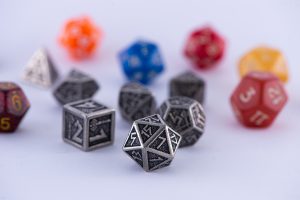 Last Friday, I joined in on a Dungeons & Dragons (DnD) campaign. This wasn’t just gratuitous fun, however, but was explicitly run to connect to Learning & Development folks (LnD). Organized by the Training, Learning, and Development Community (a competitor to LDA? I have bias. ;), there was both some preliminary guidance, and outcomes. I was privileged to play a role, and while not an official part of the followup (happening this week), I thought I’d share my reflections.
Last Friday, I joined in on a Dungeons & Dragons (DnD) campaign. This wasn’t just gratuitous fun, however, but was explicitly run to connect to Learning & Development folks (LnD). Organized by the Training, Learning, and Development Community (a competitor to LDA? I have bias. ;), there was both some preliminary guidance, and outcomes. I was privileged to play a role, and while not an official part of the followup (happening this week), I thought I’d share my reflections.
So, first, my DnD history. I played a few times while in college, but… I gave it up when a favorite character of mine was killed by an evil trap (that was really too advanced for our party). I’ve played a lot of RPGs since then, with a lot of similarities to the formal DnD games (tho’ the actual ones are too complex). Recently, with guidance from offspring two, our family is getting back into it (with a prompt from a Shakespeare and DnD skit at the local Renaissance Faire).
Then, I’ve been into games for learning since my first job out of college, programming educational computer games. It also became the catalyst for my ongoing exploration of engagement to accompany my interest in cognition/learning, design, and technology. The intersection of which is where I’ve pretty much stayed (in a variety of roles), since then! (And, led to my first book on how to do same.)
Also, about DnD. It’s a game where you create a character. There are lots of details. For one, your characteristics: strength, dexterity, wisdom, intelligence, and more. Those combine with lots of attributes (such race & role). Then, there’s lots of elaboration: backstory, equipment, and more. This can alter during the game, where your abilities also rise. This adds complexity to support ongoing engagement. (I heard one team has been going for over 40 years!)
Characters created by the players are then set loose in a campaign (a setting, precipitating story, and potential details). A Dungeon Master runs the game, Keegan Long-Wheeler in our case, writing it and managing the details. Outcomes happen probabilistically by rolling dice. Computers can play a role. For one, through apps that handle details like rolling the dice. Then folks create games that reflect pre-written campaigns.
One important thing, to me, is that the players organize and make decisions together. We were a group who didn’t necessarily know each other, and we were playing under time constraints. This meant we didn’t have the dialog and choices that might typically emerge in such playing. Yet, we managed a successful engagement in the hour+ we were playing. And had fun!
I was an early advocate of games for learning. To be clear, not the tarted up drill and kill we were mostly doing, but inspired by adventure games. John Carroll had written about this back in the day, I found out. However, I’d already seen adventure games having the potential to be a basis for learning. Adventure games naturally require exploring. In them, you’re putting clues together to choose actions to overcome obstacles. Which, really, is good learning practice! That is, making decisions in context in games is good practice for making decisions in performance situations. Okay, with the caveat that you should design the game so that decisions have a natural embed.
The complexity of DnD is a bit much, in my mind, for LnD, but…the design! The underlying principles of designing campaigns bears some relation to designing learning experiences. I believe designing engaging learning may be harder than designing learning or games, but we do have good principles. I do believe learning can, and should, be ‘hard fun‘. Heck, it’s the topic of my most recent tome! (I believe learning should be the elegant integration of learning science with engagement.)
This has been an opportunity to reflect a bit on the underlying structure of games, and what makes them work. That’s always a happy time for me. So, I’m curious what you see about the links between games and learning!